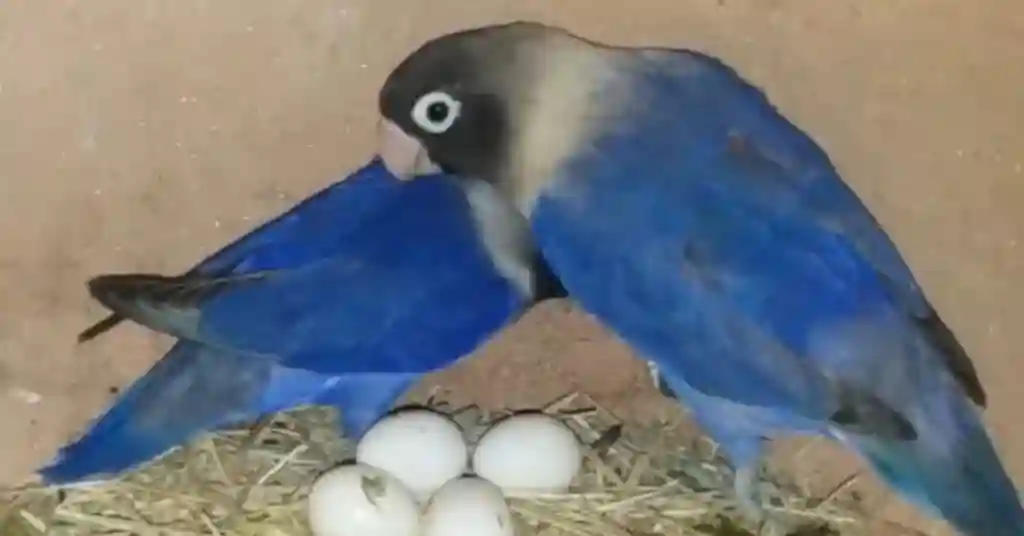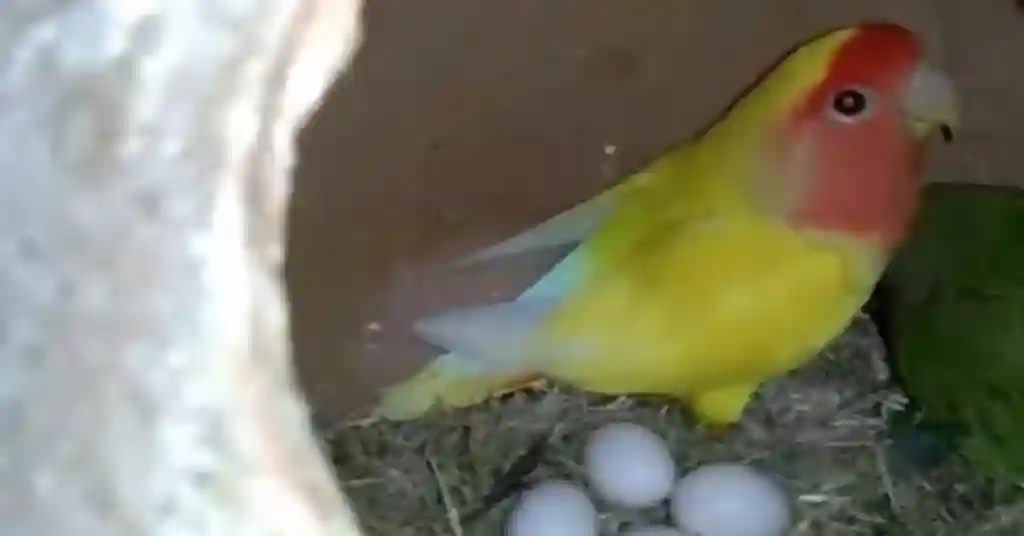The love birds egg hatching time can be an exciting but nerve-wracking experience, especially if you’re not sure what to expect or what the best practises are.
You may wonder why some eggs take longer to hatch than others, or if you should do anything special to help them along or slow them down.
To help you deal with all this stress and worry, follow these 10 tips on love birds egg hatching time.
Important 10 tips on love birds egg hatching time for owners

1) Choose Lovebirds Who Have Been Together for a While
Lovebirds who have been with each other for a while tend to get along much better than new pairs.
It’s important to check with your local wildlife shelter or avian vet to see if they have any breeding pairs that you can adopt and bring home together.
If you want to set up a nest box, make sure you know that your birds are ready and willing first.
This means watching them interact with each other for a couple weeks at least, plus observing their behaviour around potential nesting materials-do they show an interest in them?
Do they both inspect items like twigs, straws, grass clippings, or chewed up paper?
The key is finding out if there is an instinctual drive to build a nest and hatch eggs within your pair of birds.
2) Provide Privacy
This is an essential part of a successful breeding set-up, especially for shy species like lovebirds.
Love birds owners have found success using black wire grids from office supply stores as cage covers.
It’s easy to cut these sheets of wire to custom fit your cage, but you should allow for a few extra inches at each end so it’s easy to attach clips and screws.
Another benefit of covering your cages with a wire grid is that it will help keep your birds calm when you’re not around.
They won’t be able to see out and get stressed by strange surroundings or family members walking in and out of their cages while they are in them.
3) Provide an Egg Cosy
If you live in a part of the world where it is still cold, or will be soon, then it’s probably going to be chilly in your home when you have an egg nesting.
This can cause a problem because your babies are still developing and not able to maintain their own body heat at first.
This means that you need to give them as much warmth as possible during those early days.
The best way to do that is with an egg cosy. Egg cosies are soft fabric covers with little pockets for air-holes, where eggs are nestled until they hatch.
Keeping them warm while they develop and providing them with oxygen so they can grow strong bones.
4) Keep Things Quiet
Until your eggs hatch, there’s really nothing to do but wait. During that time, keep your birds out of bright sunlight and ideally away from other pets or children.
Also be sure to avoid extreme temperatures as well as loud noises or unexpected changes in routine.
If you can provide a consistent environment for incubation and post-hatch care, you will greatly increase your chances of success.
5) Give Lots of Light
It is best to place your bird’s cage in a well-lit room that receives plenty of sunlight.
Birds have a natural rhythm when it comes to light, so they need to have access to light in order to stay healthy.
Without enough light, birds can become listless and lethargic, but if you give them too much light, their moods can change just as quickly.
Give them 12 hours of light and 12 hours of darkness for perfect health.
6) Provide Fresh Water Daily
Water is crucial to birds and can be a deciding factor in whether they stay healthy or get sick.
So, it’s important to provide your birds with fresh water daily so they can stay hydrated throughout their lives.
For pet parrots, you can use a birdbath or another type of water source that allows them to immerse themselves in a nice, clean bowl of fresh water.
But if you’re caring for smaller birds like finches or even canaries.
You might prefer something more simple like a shallow dish filled with clean tap water that won’t take up too much space in your home.
Regardless of what kind of bird care setup you have for your feathered friends, remember: Birds need fresh water every day so give them plenty.
7) Offer Soft Foods
Offering soft foods is important for all baby birds, but particularly for those who are just out of an egg.
The transition from hard to soft food isn’t always easy, and it can take days for a chick to get used to swallowing new food.
Before you start serving up mashes and pellets, spend some time with your bird by hand feeding it.
This will help him get used to eating new foods while gaining strength in his neck muscles-and you’ll also get a few treats in.
Chicks need between 60 and 70 calories per pound of body weight every day; a pair of newly hatched African grey parrots eats about 800 calories a day.
8) Clean the Nest Box Regularly
Lovebirds are very particular about their nests and they will stop laying eggs in a dirty nest box.
If your birds have stopped laying or you have empty nest syndrome, clean their cage and accessories thoroughly.
First, remove all food, toys and decorations from your bird cages. Spray everything with a disinfectant spray.
Then rinse everything clean with hot water. Allow it to dry completely before returning it to your pet birds cage.
Don’t use bleach or ammonia to clean your bird’s cage because these products can harm him if he eats them by accident when he pricks his feathers after playing with his toys.
9) Expect the Unexpected
An average incubation period for most birds is about 25 days. However, you never know what Mother Nature will throw at you.
Factors like incorrect temperature control and other problems may affect how long it takes for your eggs to hatch.
The important thing is to be prepared for anything and expect things to go wrong at some point or another. That way, you’ll have a backup plan ready to put into action if necessary.
10) Stay Calm
It’s natural to worry, but if you stay calm, your parrot will be calmer too.
In fact, while there are some factors that can’t be helped like lighting conditions and other environmental issues, a lot of what happens when an egg hatches is based on your behaviour.
If you stay calm during incubation, chances are good that your baby birds will be pretty chill too.
You can take matters into your own hands by helping with as much of their development as possible from day one, when they come out of their shell.
They’ll be less stressed and so will you.
How many eggs do lovebirds lay in a year?

Lovebirds lay a clutch of 2 to 5 or 6 eggs. The first egg is laid as early as four days after mating, and typically every other day after that.
There can be up to a three-day incubation period for all eggs, but usually it’s much shorter than that-closer to 19 hours rather than 21 or 22. What does a lovebird nest look like?
It’s hard to miss if you see it-they’re surprisingly big (about 10 inches across). Like many birds, they do most of their work at night when it’s cooler and less active in their nests.
Their nests are made from soft materials (leaves) which helps insulate them, so they only need small amounts of nesting material to keep their eggs warm.
How many eggs do lovebirds lay at a time?
Lovebirds lay three to five eggs at a time. Many times people don’t realise that a hen will sit on her eggs and not move for up to 14 days or until she hears her babies chirping.
The incubation period is about 18 days, but since lovebirds usually begin incubating their eggs as soon as they are laid, it is possible for a hen to hatch one of her eggs in 11 days.
Hens usually wait anywhere from one day to six days before adding another egg under hers.
The love birds egg hatching temperature
Incubation is best done at 100–102 °F (38–39 °C). Temperatures outside of that range are acceptable.
But they may slow down incubation, cause abnormal development or even death of embryos.
When you find your eggs and put them in an incubator it is important to check its temperature with a thermometer.
It should be between 100 and 102 degrees F (38 and 39 C) for optimal results.
African love birds egg hatching time
Eggs should be incubated within 24 hours of being laid. African Love Birds do not sit well, so you should use a bottom only incubator that has a screen to allow air flow through.
A light bulb will keep your eggs warm and help develop proper feather growth, but DO NOT turn it on until your eggs have been incubating for 6-8 days.
The temperature in your incubator should remain at 99 degrees during those first 8 days (this is known as set point).
Then decrease by 1 degree every day until you reach 88 degrees. Your eggs will hatch between 22-25 days.
Make sure to keep them in a dark room until they are fully hatched; turning lights off during peak hatching times can make all of their feathers fall out.
Why love birds break their eggs?
Love birds tend to break their eggs when they are either very young or they’re in a new environment and not sure what to do.
The easiest way to prevent your lovebird from breaking its eggs is to remove any extra perches, toys, mirrors etc. That might confuse your bird and give it something to obsess over.
If you just got your pair of love birds then you should be prepared for broken eggs because of all of these changes occurring at once.
This can cause a lot of stress in a bird and some might break their eggs while others won’t break them at all.
Love birds laying eggs, but not hatching
Before you become too worried about your bird laying eggs, remember that it is not uncommon for birds to lay an egg or two without ever getting around to sitting on them.
If a pair of lovebirds has been together long enough, they will build a nest out of twigs and straws in their cage and lay one or two eggs.
If a female sits on her eggs but never hatches them, there is likely something wrong with her incubation behaviour, so do your research first.
In any case, if you have been keeping your bird inside for much of its life and are surprised when it lays an egg(s), contact your avian vet immediately.
Does love birds lay eggs in cage?
In most cases, your lovebird will lay eggs in their cage. However, if you’re breeding a pair of lovebirds or breeding them for exhibition purposes, you’ll want to put them in an aviary.
In any case, make sure you provide food and water for your birds so they have all they need while they are sitting on their eggs.
For example, in colder temperatures or climates your birds may require additional heat or supplemental food while hatching.
You should also remove any nesting material you don’t want used for nesting when it comes time to hatch.
Also, keep an eye out for anything that could harm your birds, such as sharp toys, and be sure to clean up after them during their incubation period.
FAQs:
How long do lovebird eggs take to hatch?
Lovebirds lay their eggs about a week after mating. On average, it takes about 23 days for eggs to hatch.
In which month love birds lay eggs?
In most cases, love birds will lay eggs in February. However, some pairs will begin laying as early as January.
How many times do lovebirds lay eggs in a year?
There are four main types of lovebirds. The peach-faced Lovebird is one of those species and can lay eggs up to three times a year.
How do lovebird eggs hatch at home?
Lovebird eggs are incubated for 18 days. The best place to put them is in a small cardboard box lined with paper towels.
Conclusion:
These tips should help you figure out how long it takes for bird eggs to hatch, but don’t forget that every bird is different and there are tons of factors that can affect how long it takes.
And, of course, there’s no guarantee of what colour your bird will be. Whatever I hope you enjoyed our article about love birds egg hatching time.
If yes, then do share these articles with your loved ones, family, and friends.
Thank you for Reading!


Yes, of course, I enjoyed this article. It is very informative. I hope it will help me too conscious about those matters.
Thank you so much.
3 eggs haven’t hatch yet it’s been 3 weeks
One egg hatch ,hav 4 more to go, hope all is well ,am very excited,am wondering should I check to see if the baby is ok or leave it alone